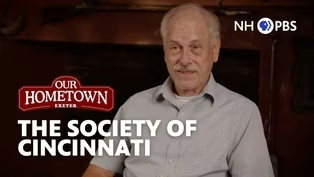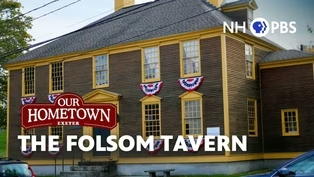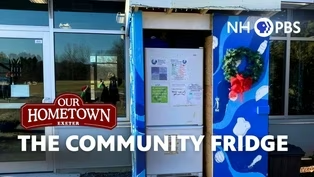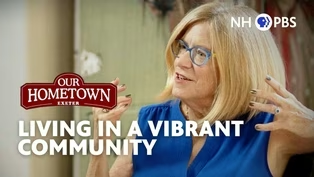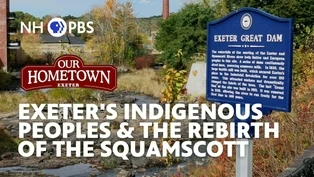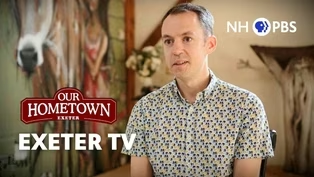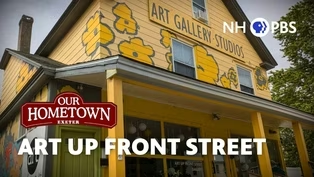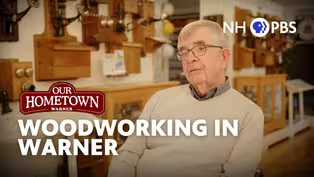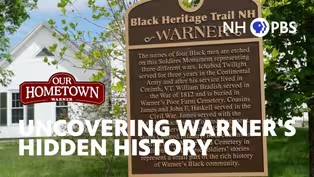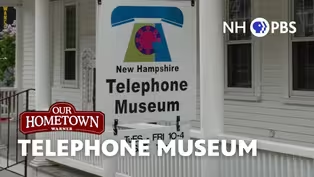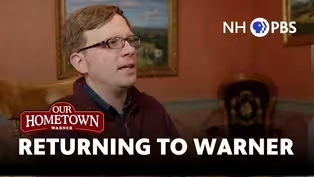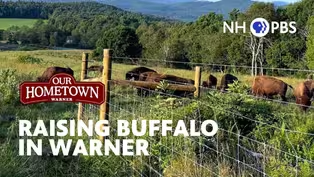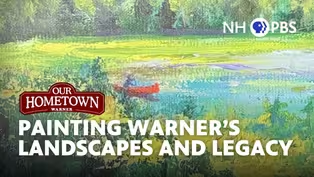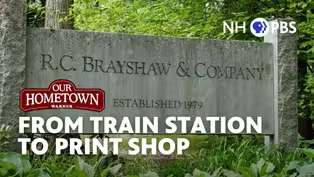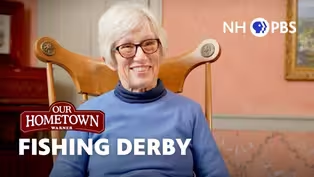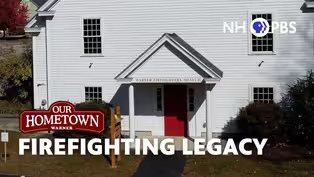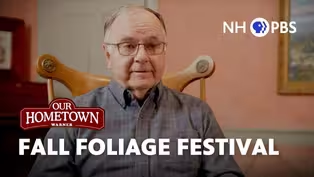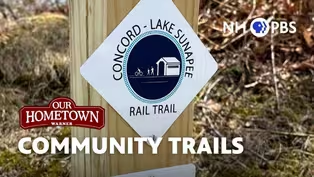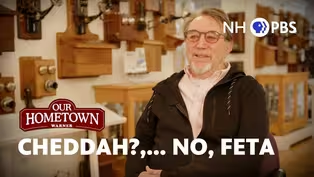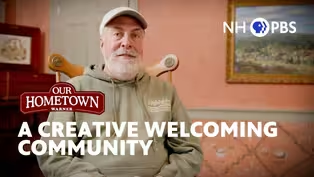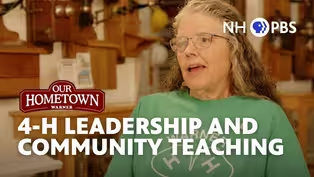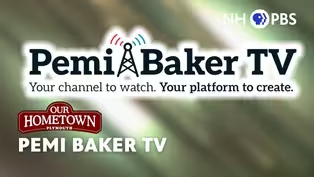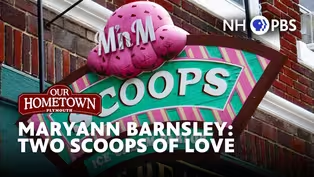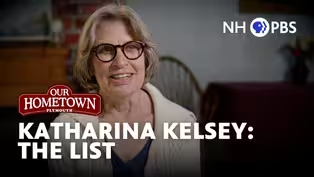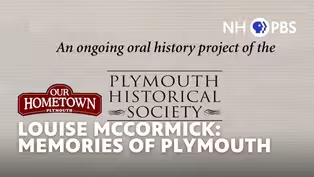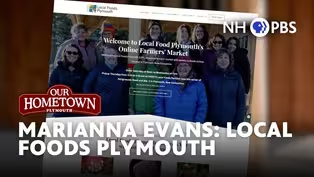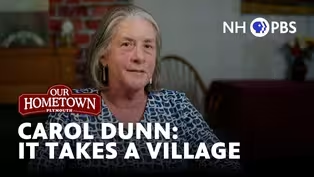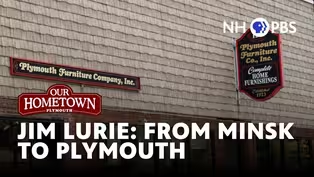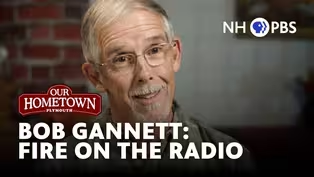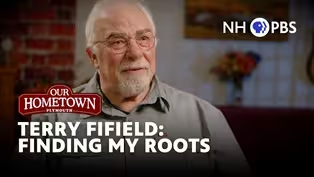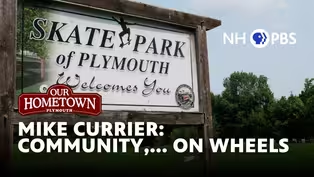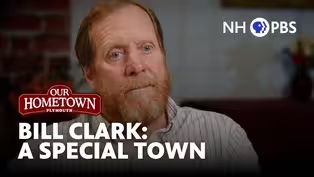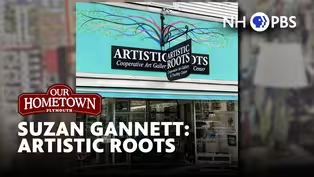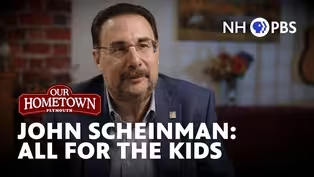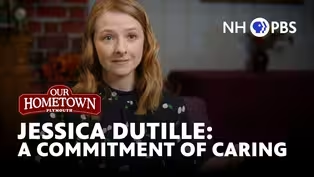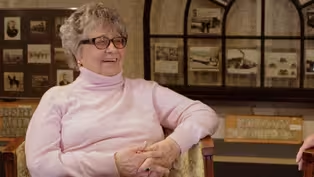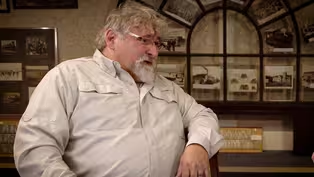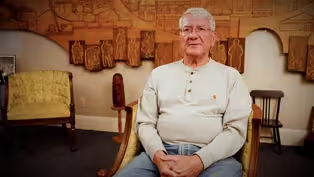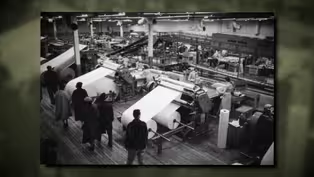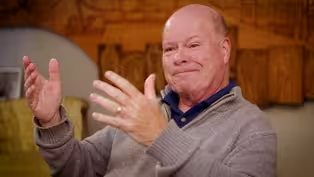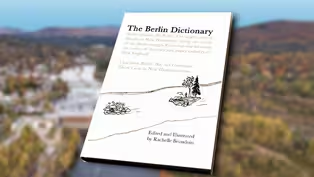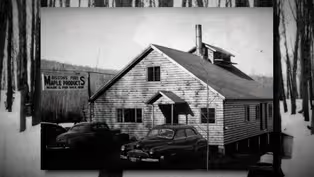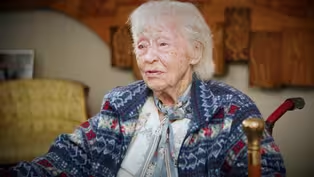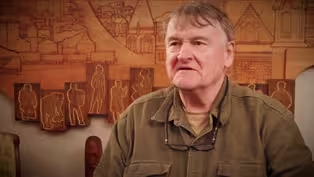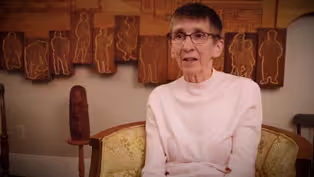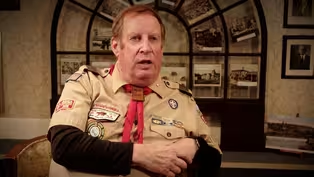Warner | Telephone Museum
Clip | 6m 22sVideo has Closed Captions
Graham Gifford shares how Warner’s telephone museum came to life—surprising all.
Graham Gifford tells the story of how Aldrick Violette’s vision turned a collection of antique phones into a beloved local museum. With thousands of artifacts and 20 years of history, this one-of-a-kind spot surprises and delights all who find it.
Problems playing video? | Closed Captioning Feedback
Problems playing video? | Closed Captioning Feedback
Warner | Telephone Museum
Clip | 6m 22sVideo has Closed Captions
Graham Gifford tells the story of how Aldrick Violette’s vision turned a collection of antique phones into a beloved local museum. With thousands of artifacts and 20 years of history, this one-of-a-kind spot surprises and delights all who find it.
Problems playing video? | Closed Captioning Feedback
How to Watch
is available to stream on pbs.org and the free PBS App, available on iPhone, Apple TV, Android TV, Android smartphones, Amazon Fire TV, Amazon Fire Tablet, Roku, Samsung Smart TV, and Vizio.
well, quite frankly, it actually began many, many years ago.
It was the brainchild of Aldrick Violette, and he was working in the telephone industry and had grand hopes of one day being able to collect a variety of these phones and share them with the community.
So with that in mind, he would sort of stash things away at his house, in his office, in his barn, and then ultimately the designs were made.
The building was built 2001 2005.
The museum actually opened and 500 people showed up that day.
And we have been here now.
Well, this October will be 20 years, It's a bit of a surprise for most people that either just happen upon us or find us online.
And of course, we we quite frankly love to see the expressions of people's faces because when they walk in, they expect one, two telephones, some spiderwebs, dusty.
And they walk into this absolutely breathtaking, very spotless building with, I don't know how many phones and artifacts we've lost count.
It's thousands, thousands of them.
So people have a great time when they're here.
Yeah.
And because we have so, so many different artifacts and we've been here for 20 years, we have things from just just one off artifacts.
You know, somebody's grandfather had it in their barn, and he they wanted to give it to us.
We have large collections, just single collections.
So it depends on what it is.
We recently got, Spider-Man telephone two, by the way, which is now on the novelty wall, which is a huge hit, Also, people say, well, do you think the visit would be about a half hour or so?
The average visit is about three hours.
People love it because it brings back so many memories and there's so many things to experience and touch.
We're not your typical museum.
There's lots of things that you can touch.
Although we do have Monets, so to speak.
But there's just a lot of activity and a lot of hustle and whatnot.
So.
So you don't get bored easily here, which is a big surprise for our first time visitors.
I am proud to say that after all this time and last year alone, we had 4000 visitors.
So we see a lot of people if we can get them up that last granite step and get them in that door, we got them, we got them.
You.
You can't help but fall in love with this place if for no other reason.
There is so, so much here.
so there's a lot to offer people.
I think they don't realize that when they walk in.
The name of the museum is a bit tricky.
Telephone museum sounds very limiting.
But there's so much more.
It's so much more.
I love this place.
So when when Dick arrived from Van Buren, Maine, he drove down from Van Buren, Maine, in 1935.
The reason for that, he wanted to help, establish the Civilian Conservation Corps.
So the story goes, from what I understand, and I did have the privilege of of talking and meeting with Dick for a number of, of years.
So he comes down through Warner, New Hampshire, and at the time, Warner was lined with elm trees.
It was Warner Village is beautiful now, but apparently it was simply breathtaking then.
So Dick comes through Warner falls instantly in love with the town, says, I'm going to move here.
This is a wonderful place.
Well, then, of course, the next thing that will happen he met a lovely young lady named Alice and of course fell in love with Alice.
So they did live here.
And he began in 1946 to work in the telephone industry, which was established here.
At that point.
He would then spend years in the industry, obviously an independent telephone company, which they had established.
That's why the museum is here.
As a matter of fact, the building next door was once upon a time part of the MCT Telecom, which was the independent that Dick actually worked for and then ultimately owned and then ultimately sold.
So that's why the museum is here in Little Warner, New Hampshire.
That room over there is called the Sound Wave Lab, and it has been on our wish list for years.
Once upon a time, we used to change and do special exhibits every year, which was fascinating.
We still do that on a smaller level, but we wanted hands on rooms.
People love to touch things.
Plus, if you're a visual learner like myself, like a lot of people that come in here, it makes it a little easier because there are some elements, particularly the technology, that can be tricky to comprehend.
And so what do you do?
Well, you design rooms that people can go into.
You can learn Morse code.
You can play with a guitar.
Why a guitar at a telephone museum?
Sound.
It's all about sound.
How it how we perceive it, how it behaves in the airwave.
So we have a tubulum.
If you're not familiar with the tubulum, the Blue Man group played a tubulum.
That too helps us understand and teach how hearing works, how the phone technology works.
So all of these little vignettes of of hands on, that's where the three hour visit comes in.
Because I don't care if you are seven or if you are 95.
And I have seen 95 year olds come in and whomp on a on a tubulum them, which is visually fabulous.
Everybody loves it.
They love to come in and play, so it works out perfectly.
Exeter | The Society of Cincinnati
Video has Closed Captions
Clip | 6m 13s | Dana tells us about the genesis of the Society of Cincinnati in New Hampshire. (6m 13s)
Video has Closed Captions
Clip | 5m 57s | Rebeccah tells us about the beautiful architecture & rich history of the Folsom Tavern. (5m 57s)
Video has Closed Captions
Clip | 4m 11s | Alexis Cargill speaks about the Community Fridge; a self-serve food clearinghouse. (4m 11s)
Exeter | Living in a Vibrant Community
Video has Closed Captions
Clip | 3m 30s | Cathleen Toomey talks about moving to, and living in such a diverse, thriving community. (3m 30s)
Exeter | Indigenous Peoples & the Rebirth of the Squamscott
Video has Closed Captions
Clip | 6m 28s | Denise and Paul Pouliot tell us about the indigenous roots of many of the area names. (6m 28s)
Video has Closed Captions
Clip | 5m 21s | Bob Glowacky tells us about the many things that Exeter TV is doing to connect & build community. (5m 21s)
Video has Closed Captions
Clip | 4m 39s | Rose talks about the vibrant art community in Exeter, and how she started her studio & gallery. (4m 39s)
Warner | Woodworking in Warner
Video has Closed Captions
Clip | 2m 10s | Jim McLaughlin shares how woodworking deepened his bond with Warner. (2m 10s)
Warner | Uncovering Warner's Hidden History
Video has Closed Captions
Clip | 5m 7s | Discover Warner’s untold Black history with local historian Rebecca Courser. (5m 7s)
Video has Closed Captions
Clip | 6m 22s | Graham Gifford shares how Warner’s telephone museum came to life—surprising all. (6m 22s)
Video has Closed Captions
Clip | 2m 53s | Ian Rogers shares how travel and Warner’s community shaped his independent spirit. (2m 53s)
Warner | Raising Buffalo in Warner
Video has Closed Captions
Clip | 4m 47s | Brian & Kira Farmer share why they moved to Warner and raise buffalo on their farm. (4m 47s)
Warner | Painting Warner's Landscapes and Legacy
Video has Closed Captions
Clip | 2m 17s | Artist Mimi Wiggin paints her family’s legacy and Warner’s landscapes and traditions. (2m 17s)
Video has Closed Captions
Clip | 7m 57s | Neil Nevins tells about their non-profit, "Main Street Warner". (7m 57s)
Warner | From Train Station to Print Shop
Video has Closed Captions
Clip | 5m 56s | Jeremy reflects on the vibrant life surrounding Warner’s beloved train station. (5m 56s)
Video has Closed Captions
Clip | 2m 24s | Nancy Martin shares funny, fishy memories from Warner’s kids’ derby. (2m 24s)
Video has Closed Captions
Clip | 5m 1s | The rich history of Warner's fire department. (5m 1s)
Warner | Fall Foliage Festival
Video has Closed Captions
Clip | 2m | Ray Martin reflects on decades organizing the Warner Fall Foliage Festival and service. (2m)
Video has Closed Captions
Clip | 3m 52s | Tim Blagden shares how Warner’s abandoned rails became a community trail vision. (3m 52s)
Video has Closed Captions
Clip | 7m | Apryl Blood and Patty Anderson discussing their roles in the community. (7m)
Warner | Cheddah?,... No, Feta
Video has Closed Captions
Clip | 4m 34s | Author David Elliott speaks about moving to Warner. (4m 34s)
Warner | A Creative Welcoming Community
Video has Closed Captions
Clip | 4m 7s | As a radio guy and author, Matt Esenwine talks about coming to Warner. (4m 7s)
Warner | 4-H Leadership and Community Teaching
Video has Closed Captions
Clip | 5m 41s | Susan Jenna and Abigail R. reflect on decades of 4-H leadership and community teaching. (5m 41s)
Video has Closed Captions
Clip | 3m 15s | Dan Salzer and Jonathon Picard talk about Pemi Baker TV. (3m 15s)
Video has Closed Captions
Clip | 3m | Maryann Barnsley tells us about a childhood dream. (3m)
Video has Closed Captions
Clip | 2m 1s | Katharina Kelsey and her husband made a list, Plymouth checked all the boxes, and so much more. (2m 1s)
Plymouth | The Happiness Quest
Video has Closed Captions
Clip | 2m 34s | Dr. Marie Sanders relates what can happen when an entire town works together to discover happiness. (2m 34s)
Plymouth | Memories, Stories and Cake
Video has Closed Captions
Clip | 5m 41s | Patricia Hoyt came to Plymouth for college, launched her career here. (5m 41s)
Plymouth | Memories of Plymouth
Video has Closed Captions
Clip | 1m 55s | Louise McCormick is a townie. She grew up in Plymouth, and has spent most of her life here. (1m 55s)
Plymouth | Local Foods Plymouth
Video has Closed Captions
Clip | 3m 23s | Marianna Evans talks about Local Foods Plymouth, and how the pandemic helped to create a model. (3m 23s)
Video has Closed Captions
Clip | 2m 21s | Carol Dunn tells about how this amazing town bonded together to save her business on Main Street. (2m 21s)
Plymouth | From Minsk to Plymouth
Video has Closed Captions
Clip | 3m 41s | Jim Lurie tells us how in 1917, his grandfather travelled from Minsk, Russia, across Siberia. (3m 41s)
Video has Closed Captions
Clip | 1m 34s | Bob Gannett speaks about an interesting story unfolding as he was on the radio. (1m 34s)
Video has Closed Captions
Clip | 4m | Terry Fifield has lived in a lot of places, but found that the Plymouth area to be the best. (4m)
Plymouth | Community... on Wheels
Video has Closed Captions
Clip | 6m 14s | Mike Currier talks about the roots of the Plymouth Skate Park. (6m 14s)
Video has Closed Captions
Clip | 1m 45s | Bill Clark talks about, even with growth and progress, Plymouth is a special town. (1m 45s)
Video has Closed Captions
Clip | 4m 19s | Suzan Gannett talks about Artistic Roots, and the programs and passions that it has inspired. (4m 19s)
Video has Closed Captions
Clip | 2m 31s | John Scheinman shares how the skills needed in successfully coaching can be used. (2m 31s)
Plymouth | A Commitment of Caring
Video has Closed Captions
Clip | 5m 1s | Jessica Dutille talks about re-building community, after the pandemic changed the world. (5m 1s)
Video has Closed Captions
Clip | 4m 16s | Yvonne recalls growing up in Berlin, and speaking two languages in school. (4m 16s)
Video has Closed Captions
Clip | 6m 41s | Andre speaks to us about growing up in Berlin. (6m 41s)
Video has Closed Captions
Clip | 12m 40s | Walter tells us about Berlin's Skier/Soldier, Paul Petersen, and a love story. (12m 40s)
Video has Closed Captions
Clip | 3m 36s | Roland talks about working in every aspect of the paper industry, over 4+ decades. (3m 36s)
Video has Closed Captions
Clip | 4m 19s | Renney tells a couple of great stories about growing up in Berlin. (4m 19s)
Video has Closed Captions
Clip | 5m 37s | Berlin has a language all its own, and Rachelle decided to compile a dictionary of words. (5m 37s)
Video has Closed Captions
Clip | 4m 24s | Olive speaks about growing up in Berlin, in a family that owned Bisson's Sugar House. (4m 24s)
Video has Closed Captions
Clip | 3m 5s | Lorna recalls heading into Berlin on Friday nights, for shopping & meeting up with friends (3m 5s)
Video has Closed Captions
Clip | 3m 54s | Moving to Berlin was a dream come true for Haven, as he loved working in the woods. (3m 54s)
Video has Closed Captions
Clip | 2m 43s | Diane talks about going from a 45 year career in the banking industry. (2m 43s)
Video has Closed Captions
Clip | 6m 40s | Dennis tells the story of the history of boy scouts in Berlin, NH. (6m 40s)
Providing Support for PBS.org
Learn Moreabout PBS online sponsorshipSupport for PBS provided by:
